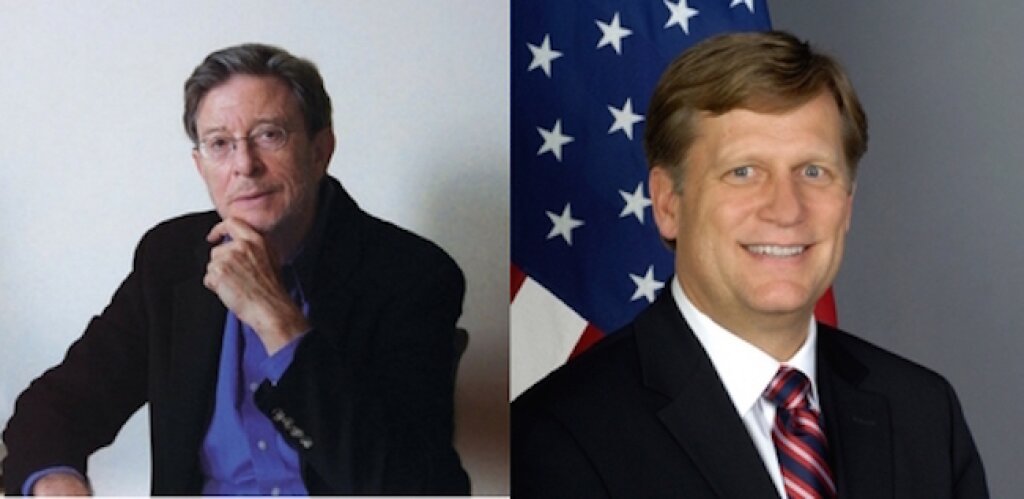Watch the event video here!
Read the event recap here!
Wednesday, May 9, 2018
5:00pm - 7:00pm
Teatro, Italian Academy (1161 Amsterdam Avenue)
Columbia University
Please join New York University’s Jordan Center for the Advanced Study of Russia and The Harriman Institute for a debate between Stephen F. Cohen (Professor Emeritus of Russian Studies at New York University and Professor Emeritus of Politics at Princeton University) and Michael McFaul (Professor, Department of Political Science, Stanford University) on “The New U.S.-Russian Cold War: Who is to Blame?"
Registration is required. PLEASE CLICK HERE TO REGISTER.
This event is part of the Columbia-NYU New York Russia Public Policy Series. Support for this event is provided by a grant from the Carnegie Corporation of New York.
U.S.-Russia relations are at their worst since the Soviet era. The two countries remain at odds over policy towards Syria, Ukraine and questions of global leadership. Rather than engage in a “reset” of U.S.-Russia relations during the Trump administration, relations have deteriorated as the U.S. has tightened its sanctions regimes and the current investigation into Russian interference in the 2016 US Presidential elections has further inflamed tensions. News cycles in both countries are dominated by negative stories and images of the other side.
How did relations between the Untied States and Russia deteriorate to this point and who is to blame? Is the current “New Cold War” or “Hot Peace” the result of an aggressive and resurgent Russia, led by President Vladimir Putin, that has made confrontation with the West a central component of its foreign policy and attempts to garner domestic popular support? Or should the United States and its allies be blamed for not treating Russia as an important power in the post-Cold War era and instead continuing to push Westernizing organizations (such as NATO) and influences (Liberal democratic values) into Moscow's orbit? Are the two sides misunderstanding and misrepresenting one another or do they simply have incompatible national interests that can never be reconciled? And what should be done to ease tensions and find a new basis for normalizing relations?
Copies of Professor McFaul’s latest book From Cold War to Hot Peace: An American Ambassador in Putin’s Russia (Houghton Mifflin Harcourt, 2018) will be available on-site for purchase.
Michael McFaul is Professor of Political Science, Director and Senior Fellow at the Freeman Spogli Institute for International Studies, and the Peter and Helen Bing Senior Fellow at the Hoover Institution. He joined the Stanford faculty in 1995. He is also an analyst for NBC News and a contributing columnist to The Washington Post. Dr. McFaul served for five years in the Obama administration, first as Special Assistant to the President and Senior Director for Russian and Eurasian Affairs at the National Security Council at the White House (2009-2012), and then as U.S. Ambassador to the Russian Federation (2012-2014). He has authored several books, including From Cold War to Hot Peace: An American Ambassador in Putin's Russia; Advancing Democracy Abroad: Why We Should, How We Can; with Kathryn Stoner, Transitions To Democracy: A Comparative Perspective; with James Goldgeier, Power and Purpose: American Policy toward Russia after the Cold War; and Russia’s Unfinished Revolution: Political Change from Gorbachev to Putin. His current research interests include American foreign policy, great power relations, and the relationship between democracy and development. Dr. McFaul was born and raised in Montana. He received his B.A. in International Relations and Slavic Languages and his M.A. in Soviet and East European Studies from Stanford University in 1986. As a Rhodes Scholar, he completed his D. Phil. in International Relations at Oxford University in 1991.
Stephen F. Cohen — who grew up in Kentucky, received his BS and MA degrees from Indiana University and PhD degree from Columbia University — is Professor Emeritus of Russian Studies and Politics at New York University and Princeton University. He is author of several well-known books, including Bukharin and the Bolshevik Revolution: A Political Biography; Rethinking the Soviet Experience; Failed Crusade: America and the Tragedy of Post-Communist Russia; The Victims Return: Survivors of the Gulag After Stalin; and Soviet Fates and Lost Alternatives: From Stalinism to the New Cold War. His Why Cold War Again? will be published in 2019. A longtime media commentator, Cohen writes regularly for The Nation magazine. He is recipient of several awards, including two Guggenheim fellowships for his scholarly work. He is also a member of the Board of the American Committee for East-West Accord (eastwestaccord.com).
Co-Chaired by Alexander Cooley (Harriman Institute) and Joshua Tucker (NYU Jordan Center).
REGISTRATION INFO
Click here to register. Seating is limited and will be available on a first come, first seated basis. Registration does not guarantee admission to the event. We recommend that you arrive early to sign in.
Questions about the event should be directed to: Carly Jackson, Program Coordinator, Harriman Institute
crj2116@columbia.edu
Press inquiries should be sent to: James Devitt, Director of Public Affairs, New York University
(212) 998-6808
james.devitt@nyu.edu



